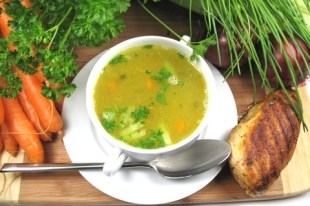No more chicken soup, thanks mum! I know you think it will do me some good, but I’m not sure the evidence is on your side
Of all the homemade winter cure-alls, chicken soup is the best known and most loved. In fact the term “chicken soup” has become idiomatic for all things restorative; benefiting every possible problem from the head to the soul.
In many different cultures, chicken soup is a traditional treatment for symptoms of the common cold.
Chicken soup is widely known as “Jewish Penicillin”. This is not some anti-Semetic jibe on a frugal avoidance of appropriate health care. Nor is it a reflection of its assumed lack of efficacy (as antibiotics, like penicillin, don’t help viral illnesses, like the common cold).
In fact, in the 12th century, the Rambam, Rabbi Moses Maimonides published, in his “Medical Responsa”, the many health benefits of chicken soup for a diverse range of ailments from pneumonia to a runny nose.
Some of this may reflect the traditional use of chicken soup as a Sabbath meal, and by implication, the perceived importance of piety with respect to health outcomes.
Nonetheless, it’s a staple among Jewish grandmothers and their snotty grandchildren, worldwide.
Even before the Olympics, Greek grandmothers may also claim they invented Chicken soup for the common cold.
Avgolemono (Αυγολέμονο) is a thick egg and lemon (chicken) broth widely administered for the symptoms of cold and flu, or for their prophylaxis on wet winter evenings.
Although a quintessentially Greek dish, it is likely that its therapeutic use has its earliest origin in sephardic tradition. Adding the “all important” lemon may have been the Greek contribution.
Not to be outdone, most Chinese grandmothers are ready and primed to produce chicken soup at the first sign of a sniffle.
In traditional Chinese medicine, illness is perceived as a state of imbalance between yin and yang. Yin represents the darker cooling forces, while yang embodies the lighter, warmer forces.
In this paradigm, the treatment for cold is obviously yang, and chicken soup is a prime example: restoring the yang forces and balancing the cold of yin.
There have been a few attempts to definitively establish these cold-busting effects in clinical studies
For example, one study looked at the velocity of nasal secretions in healthy volunteers after drinking different solutions1. Sipping hot chicken soup increased the velocity of secretions five minutes later, which could be a good thing for clearing a blocked nose. But the response is really no better than hot water, and was not sustained. The nasal response is also much less than achieved with pseudoephedrine (a nasal decongestant).
Some of the symptoms of a cold are caused by inflammation – as inflammatory cells rush in to defend against viral attack, they cause swelling and pain.
We know that drugs that affect inflammatory cells, like steroids, can modestly reduce the symptoms of a cold when inhaled into the nose.
Some studies have suggested that chicken soup may also directly affect these inflammatory cells. (By direct, I mean if you put diluted chicken soup directly onto these cells in a Petri dish.)
Of course, if you drink the chicken soup rather than put it up a blocked nose, the effect may be very different.
So far, studies haven’t tested whether chicken soup is really effective in fighting the common cold. And they haven’t compared the effectiveness of chicken soup against proven cold-fighting medicines such as analgesics and decongestants.
This does not mean it doesn’t work. Just that there is no reliable evidence.
But despite being untested, its legendary status has nonetheless provoked a number of attempts for rational explanations.
These include the effect of heat/steam, re-hydration and easy feeding when the throat is raw and the appetite is poor.
This goes along the same line as the feed a cold, starve a fever” hypothesis.
Certainly, malnutrition impairs the immune system, and feeding can stimulate and enhance immune responses to viruses. But why is chicken soup a better choice?
Clinical trials using zinc lozenges have suggested that they may modestly reduce the duration and severity of cold symptoms if taken within 24 hours of their onset and in doses of usually > 50 mg/day4.Some have argued that chicken soup is beneficial because it is naturally high in zinc, especially the bones and carcass that are used to make the broth. But most soup will contain less than 5mg a serve. And if zinc was the trick, oysters (at 100 mg of zinc each) should be a better option.
More recent studies have suggested carnosine a natural antioxidant that is found exclusively in meat including chicken, may provide another explanation. But it broken down so rapidly once ingested that little, if any, would reach the nose to provide relief.
Psychological stress is a risk factor for infectious diseases, including the common cold. The effect of ‘comfort foods’, from chocolate to chicken soup, on stress and mood are real and powerful in some people, but not in others. Moreover, any effects are usually transient. Chicken soup is hardly an effective way to manage stress and its effects in the long term.
But the real psychology of chicken soup can’t be overlooked: the expectation of efficacy, the succor of being cared for, the stimulation of taste on an otherwise dull day.
In traditional cooking, chicken soup is the flavor of home. It may not work, but does that really matter?
Last Reviewed 03/Mar/2014
Dr Merlin Thomas
Latest posts by Dr Merlin Thomas (see all)
- How to increase DHEA levels - 28/09/17
- Testosterone supplement benefits & risks - 11/07/17
- Health effects of tea & coffee - 10/07/17







